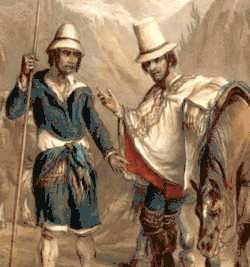Inquilino
In historic Chilean agriculture an inquilino is a labourer indebted to a landlord who allows him to form a farm in parts of his property (usually in the marginal lands to keep away intruders) and who in exchange works without pay for the landlord.[1] The inquilinos provided key manpower to carry out tasks like the gathering of livestock (rodeo) and slaughter. For inquilinos living in wheat-producing regions duties increased as the Chilean wheat cycle went on in from the 18th century onwards.[2] The inquilinaje institution that characterized large parts of Chilean agriculture were eliminated by the Chilean land reform in the 1960s and early 1970s.[3] Historian Mario Góngora has researched on the history of the inquilinos.[4]

In modern Spanish the word has the same meaning as the English "tenant".
See also
References
- Inquilino, RAE. Retrieved on July 4 2012.
- "Mestizos, inquilinos y vagabundos en Chile Colonial". Memoria Chilena (in Spanish). Biblioteca Nacional de Chile. Retrieved December 30, 2015.
- Rytkönen, P. Fruits of Capitalism: Modernization of Chilean Agriculture, 1950-2000. Lund Studies in Economic History, 31, p. 43.
- "Mario Góngora del Campo (1915-1985)". Memoria Chilena (in Spanish). Biblioteca Nacional de Chile. Retrieved December 30, 2015.
